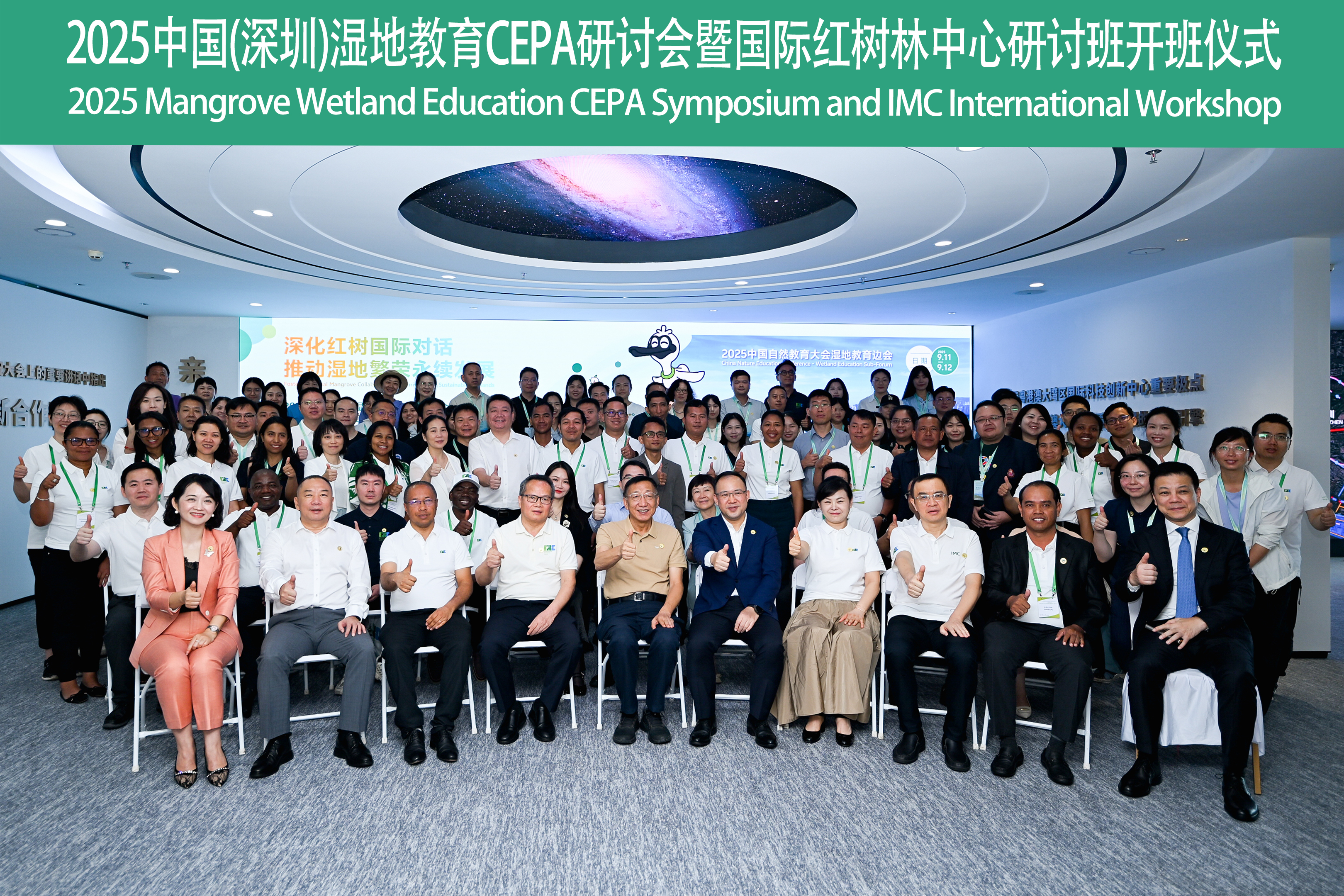On September 11, 2025, the China (Shenzhen) Wetland Education CEPA Seminar and the International Mangrove Center (IMC) Workshop officially opened in Shenzhen. Leaders from the International Mangrove Center, the Chinese Society of Forestry, the Chinese Academy of Forestry of the National Forestry and Grassland Administration (NFGA), the Shenzhen Municipal Planning and Natural Resources Bureau, the Futian District People's Government, and other institutions attended the opening ceremony, together with 23 government officials from six countries: China, Cambodia, Madagascar, Iran, Sierra Leone, and Zimbabwe.

The photo shows the opening ceremony of the China (Shenzhen) Wetland Education CEPA Seminar and the International Mangrove Center Workshop.
In his address, Ma Guangren, Deputy Director of the Chinese Society of Forestry, highlighted that Shenzhen has achieved remarkable results in nature education, particularly in wetland education, where it continues to lead nationally and serve as a model for the Greater Bay Area. The establishment of the International Mangrove Center (IMC) has further strengthened Shenzhen's international influence in wetland conservation and nature education, contributing Chinese wisdom to global ecological governance. The close collaboration between this wetland seminar and the IMC has not only raised the professional standards of the international workshop but also deepened global exchanges and cooperation in wetland conservation, providing strong support for building an international platform for the harmonious coexistence of humans and nature.
Bao Daming, Director General of the IMC Interim Secretariat, emphasized that mangroves, as the "coastal guardians" and "lungs of the ocean," play an irreplaceable role in disaster prevention, biodiversity conservation, carbon sequestration, emission reduction, and improving livelihoods. CEPA wetland education, he noted, is a vital pathway for promoting mangrove conservation, as it not only raises public awareness and community participation but also fosters collaboration and capacity building among research institutions, professionals, and practitioners. He expressed hope that this seminar would become an important platform for sharing best practices and strengthening dialogue and cooperation, thereby advancing the conservation, restoration, and sustainable development of mangroves.
Zhou Jiangtao, District Mayor of the Futian District People's Government of Shenzhen, introduced the Futian Mangrove Nature Reserve as the only mangrove reserve located in the heart of a Chinese city. In recent years, Futian District has steadily advanced the development of a wetland ecological restoration demonstration zone, enhancing biodiversity conservation, expanding high-quality coastal spaces, and improving opportunities for residents and tourists to engage with the sea. The district is committed to making mangroves a “golden name card” (prestigious emblem) that showcases Futian’s ecological quality.
Wu Xiaoping, Deputy Director of the Shenzhen Municipal Planning and Natural Resources Bureau, stated that despite experiencing rapid urban development, Shenzhen has always adhered to green principles, integrating mangrove conservation into its urban strategic planning and territorial spatial management. The city actively supports the construction of the IMC and has co-hosted multiple international workshops, creating an international platform for knowledge sharing and cooperation. Shenzhen is committed to leveraging the IMC platform to work with various countries in accumulating practical wisdom and exploring adaptive solutions, jointly shaping a beautiful blueprint for global mangrove conservation and restoration.
On behalf of the participants, Rinah Razafindrabe, Director General of Environmental Governance of the Ministry of Environment and Sustainable Development of Madagascar, delivered a speech. For island nations such as Madagascar, mangroves are not only vital ecological assets but also critical for protecting coastlines, nurturing marine life, and supporting the livelihoods of coastal communities. He expressed hope that countries would work together to strengthen technical cooperation and exchange experiences, and—with the support of the IMC—jointly promote the sustainable management and restoration of mangroves for the benefit of human well-being, biodiversity, and future generations.
During the keynote session, expert representatives from the IMC, the Futian District People’s Government of Shenzhen, Cambodia, Madagascar, the UK-based Wildfowl & Wetlands Trust (WWT), and the Mangrove Foundation shared experiences and case studies on mangrove wetland conservation. This was followed by a roundtable discussion, where representatives from five IMC member countries—Cambodia, Madagascar, Zimbabwe, Sierra Leone, and Iran—along with Chinese experts, discussed educational practices in mangrove wetland conservation.
Following the opening ceremony, participants from the six countries officially began a 10-day training course. The program invited domestic and international experts to deliver specialized lectures on topics such as: international cooperation practices in China’s forestry and grassland sector; the development and trading of mangrove carbon sink projects; mangrove conservation in Mai Po; the synergies between mangrove restoration and economic development; and maintaining ecological integrity. During the training, participants will also visit the Hainan Mangrove Nature Reserve, national wetland parks, and the Futian International Important Wetland to gain firsthand knowledge of China’s mangrove conservation and restoration technologies and practices. These activities will help promote exchanges and cooperation among member countries on mangrove conservation, restoration, and sustainable use, while jointly exploring pathways to maintain the health of global mangrove ecosystems.